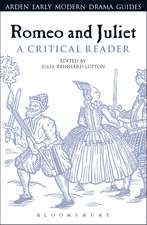Shakespeare and Greece
Editat de Professor Alison Findlay, Professor Vassiliki Markidouen Limba Engleză Hardback – 25 ian 2017
| Toate formatele și edițiile | Preț | Express |
|---|---|---|
| Paperback (1) | 236.45 lei 6-8 săpt. | |
| Bloomsbury Publishing – 25 iul 2018 | 236.45 lei 6-8 săpt. | |
| Hardback (1) | 713.29 lei 3-5 săpt. | |
| Bloomsbury Publishing – 25 ian 2017 | 713.29 lei 3-5 săpt. |
Preț: 713.29 lei
Preț vechi: 1026.95 lei
-31% Nou
Puncte Express: 1070
Preț estimativ în valută:
136.50€ • 148.22$ • 114.66£
136.50€ • 148.22$ • 114.66£
Carte disponibilă
Livrare economică 02-16 aprilie
Preluare comenzi: 021 569.72.76
Specificații
ISBN-13: 9781474244251
ISBN-10: 1474244254
Pagini: 304
Dimensiuni: 129 x 198 x 21 mm
Greutate: 0.41 kg
Editura: Bloomsbury Publishing
Colecția The Arden Shakespeare
Locul publicării:London, United Kingdom
ISBN-10: 1474244254
Pagini: 304
Dimensiuni: 129 x 198 x 21 mm
Greutate: 0.41 kg
Editura: Bloomsbury Publishing
Colecția The Arden Shakespeare
Locul publicării:London, United Kingdom
Caracteristici
Broadens current postcolonial interests in early modern attitudes to Islam and the Ottoman empire
Notă biografică
Alison Findlay is Professor of Renaissance Drama and Director of the Shakespeare Programme at Lancaster University, UK and Vassiliki Markidou is an Assistant Professor in English Literature and Culture at the Faculty of English Language and Literature, University of Athens, Greece.
Cuprins
Introduction, Alison Findlay and Vassiliki Markidou 1. The Comedy of Errors and 'farthest Greece', Kent Cartwright2. Embodying Greece in Elizabethan England: Venus and Adonis and Love's Labour's Lost, Liz Oakley-Brown 3. Greece 'digested in a play': Consuming Greek Heroism in The School of Abuse and Troilus and Cressida, Efterpi Mitsi 4. 'All's with me meet that I can fashion fit': Physis and Nomos in King Lear, Nic Panagopoulo5. Hospitality, Friendship and Republicanism in Timon of Athens, John Drakakis 6. 'To take our imagination / From bourn to bourn, region to region': The Politics of Greek Topographies in Pericles, Vassiliki Markidou7. Reshaping Athens in A Midsummer Night's Dream and The Two Noble Kinsmen, Alison Findlay 8. A Midsummer Night's Dream in Modern Athens, Mara YanniSelected Bibliography
Recenzii
A fascinating collection that brilliantly teases out the tension between the order and authority of a classical Greece and the very different status and nature of a Greece under Ottoman rule.
Shakespeare and Greece, a collection of essays edited by Alison Findlay and Vassiliki Markidou, contributes to a small but growing body of work addressing an important and understudied topic. Framed by an introduction situating the project in Shakespeare's literary and cultural landscape, the book's eight essays explore different intersections between Shakespeare and the Greek world. Their premises and methodologies vary, but together they make a strong case for the pervasiveness and importance of Shakespeare's Greek engagements . This volume illuminates a rich topic, and opens inviting directions for further study.
Shakespeare and Greece, a collection of essays edited by Alison Findlay and Vassiliki Markidou, contributes to a small but growing body of work addressing an important and understudied topic. Framed by an introduction situating the project in Shakespeare's literary and cultural landscape, the book's eight essays explore different intersections between Shakespeare and the Greek world. Their premises and methodologies vary, but together they make a strong case for the pervasiveness and importance of Shakespeare's Greek engagements . This volume illuminates a rich topic, and opens inviting directions for further study.










